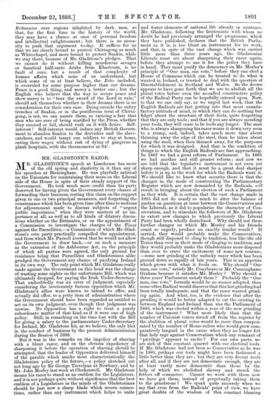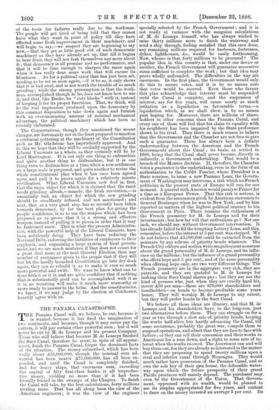MR. GLADSTONE'S RAZOR.
MR GLADSTONE'S speech at Limehouse has more of the old spring and elasticity in it than any of his speeches at Birmingham. He was playfully satirical on the Unionists for maintaining their seats on the Liberal side of the House in spite of their steady support of the Government. He took much more credit than his party deserved for having given the Government every chance of forwarding their business, resting this claim on the support given to one or two principal measures, and forgetting the forwarding their business, resting this claim on the support given to one or two principal measures, and forgetting the countenance which has been given time after time to motions for adjournment made to discuss subjects of "urgent public importance," when they were matters of no im- portance at all, as well as to all kinds of dilatory discus- sions whether on the Estimates, or on the appointment of a Commission to investigate the charges of the Times against the Parnellites,—a Commission of which Mr. Glad- stone's own party practically compelled the appointment, and from which Mr. Parnell avowed that he would not allow the Government to draw back,—or on such a measure as the extension of the Ashbourne Act, on the principle of which all parties were agreed, the only ground for resistance being that Parnellites and Gladstonians alike grudged the Government any chance of pacifying Ireland in its own way. The only point which Mr. Gladstone really made against the Government on this head was the charge of wasting some nights on the unfortunate Bill, which was ultimately dropped, for paying the Irish Under-Secretary. That undoubtedly was an error of judgment, especially considering the inveterately furious opposition which Mr. Gladstone's allies were known to intend to offer, and actually did offer, to a petty item of administration where the Government should have been regarded as entitled to act on its own judgment, even though that judgment was unwise. No Opposition has a right to treat a purely subordinate matter of that kind as if it were one of high policy. Still, in remarking on the time lost with the Bill for giving a salary to the parliamentary Under-Secretary for Ireland, Mr. Gladstone hit, as we believe, the only blot in the conduct of business by the present Administration during the Session of 1888. But it was in the remarks on the impolicy of shaving with a blunt razor, and on the obvious expediency of sharpening it before the operation of shaving should be attempted, that the leader of Opposition delivered himself of the parable which marks most characteristically the Gladstonian policy of the future,—a policy sketched out not long ago by Sir George Trevelyan at Newbury, and by Mr. John Morley last week at Clerkenwell. Mr. Gladstone means his razor to stand as an emblem for the Legislature, and it is not perhaps quite without significance that the best emblem of a Legislature in the minds of the Gladstonians should be just now a sharp blade which severs connec- tions, rather than any instrument which helps to unite and foster elements of national life already in existence. Mr. Gladstone, following the lieutenants with whom no doubt he had previously arranged the programme which they have published, declares that the British Parlia- ment as it is, is too blunt an instrument for its work, and that, in spite of the vast change which was carried little more than three years ago, the Gladstonian Liberals must set about sharpening their razor again, before they attempt to use it for the policy they have in hand. They must purify the democracy on Mr. Morley's principle of "One man, one vote," before they can elect a House of Commons which can be trusted to do what is wanted in Ireland, or trusted to deal with the question of Disestablishment in Scotland and Wales. So the decree appears to have gone forth that we are to abolish all the plural votes before even the so-called constructive policy of the Radical Party can be hopefully entered upon. Now, to that we can only say, as we urged last week, that the English Radicals are fast getting into that most unsatis- factory attitude of mind, in which they can do nothing but fidget about the structure of their tools, quite forgetting that they are only tools ; and that if you are always mending your tools, they will cease to be tools any longer. The man who is always sharpening his razor wears it down very soon to a stump, and, indeed, takes much more time about thinning away the edge of the steel, than he takes about using the steel, when thus thinned away, for the purposes for which it was designed. And that is the condition of things to which the English Radicals are fast approaching. In 1867 we had a great reform of Parliament. In 1885 we had another and still greater reform ; and now we are told that the legislative instrument is not even yet sharp enough, and that it must be a great deal sharper before it is up to the work for which the Radicals want it. We should like to know what security there is that the changes in the mode of constructing the Parliamentary Register which are now demanded by the Radicals, will result in bringing about the election of such a Parliament as they wish. It is certain that the vast change made in 1885 did not do nearly so much to alter the balance of parties on questions at issue between the Conservatives and the Liberals, as it did to popularise the character of Con- servatism, and to stimulate the followers of Mr. Gladstone to extort new changes to which previously the Liberal Party had been wholly disinclined. Why should not these further changes on which Mr. Morley and his friends count so eagerly, produce an exactly similar result ? If carried, they would probably make the Conservatives, though still disposed to cling to tradition, less like the old Tories than ever in their mode of clinging to tradition, and. they would probably make the Gladstonians more disposed than ever to crave the excitement of some new venture, —some new grinding at the unlucky razor which has been ground down so rapidly of late years. This is an appetite which grows with what it feeds on. Why should "One man, one vote," satisfy Mr. Conybeare or Mr. Cunninghame Graham because it satisfies Mr. Morley ? Why should a three years' Parliament satisfy them ? Probably the "One man, one vote," formula would be no sooner adopted, than some other Radical would discover that this last grinding had been totally inadequate, and that the razor wanted grind- ing again. And what, too, is the evidence that after the grinding it would be better adapted. to cut the existing tie between England and Ireland than was the Parliament of 1886, which was elected within a year of the new grinding of the instrument ? What more likely than that the number of Unionist voters struck off from the register by the abolition of plural votes would be more than compen- sated by the number of Home-rulers who would grow com- paratively languid in the cause when they no longer felt that holy rage against Conservatism which any remnant of " privilege ' appears to excite ? For our own parts, we are sick of this constant quarrel with our electoral tools. If Mr. Gladstone had not been so Conservative as he was in 1885, perhaps our tools might have been fashioned a little better than they are ; but they are very decent tools after all, and if they are not democratic enough, they are at least vastly more democratic than those by the help of which we abolished slavery and struck the fetters off commerce. Cannot we work with them now we have got them, instead of perpetually taking them to the grindstone ? We speak quite sincerely when we say that even from the Radicals' point of view, we have great doubts of the wisdom of this constant blaming of the tools for failures really due to the workman. The people will get tired of being told that they cannot have what they want in point of policy till they have effected some fresh improvement in their machinery, and will begin to say,—we suspect they are beginning to say now,—that they get so little good out of such democratic machinery as they have already set up, that till it begins to bear fruit, they will not fash themselves any more about it ; that democracy is all promise and no performance, and that it will be time enough to sharpen the razor again when it has really done some work that will excuse its bluntness. As for a political razor that has just been set, needing to be set so soon again,—if it be so, it only shows that it is bad steel, and is not worth the trouble of so much grinding ; while the strong presumption is that the work- man, accomplished though he be, does not know how to use it, and that, like Burke, he "cuts blocks" with it, instead of keeping it for its proper functions. That, we think, will be the real impression produced upon the democracy by this constant disposition to take down again and furnish with an ever-increasing amount of nominal mechanical advantage, the political machinery which has been so recently elaborated.
The Conservatives, though they sanctioned the recent changes, are fortunately not in the least prepared to sanction a continual pottering at the machinery of the Constitution such as Mr. Gladstone has imprudently approved. And in this we hope that they will be cordially supported by the Liberal Unionists as a whole, as they certainly will be by Lord Hartington. It is not only one thing to enfranchise and quite another thing to disfranchise, but it is one thing even to disfranchise at a time when a new settlement on a large scale is proposed, and quite another to revise the whole constitutional plan when it has once been agreed upon, and pull it to pieces again for a relatively minute rectification. What Liberal Unionists now feel is, first, that the main object for which it is claimed that the razor needs grinding afresh,—namely, the Irish revolution,---is essentially bad, an object for which the new grinding should be steadfastly refused, and not sanctioned ; and next, that as a very great step has so recently been taken towards democracy, by far the best plan for giving the people confidence, is so to use the weapon which has been prepared as to prove that it is a strong and effective weapon, instead of pulling it to pieces in order that it may be fashioned anew. This is what the present Administra- tion, with the powerful help of the Liberal Unionists, have been sedulously doing. They have been reducing the National Debt, enforcing the liabilities of employers to their employes, and organising a large system of local govern- ment, and we are much mistaken if that does not count for a great deal more at the next General Election, than any number of assurances given to the people that if they will but let the hardly launched Constitution go into dry dock again, they can so rebuild it as to make it ever so much more powerful and swift. We want to know what can be done with it as it is, and are quite confident that if nothing that is substantially good can be accomplished with it as it is, no recasting will make it much more seaworthy or more ready to answer to the helm. And the constituencies, we fancy, if we may judge by the election at Colchester, heartily agree with us.











































 Previous page
Previous page